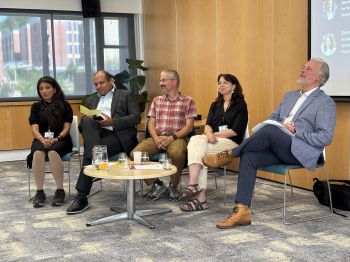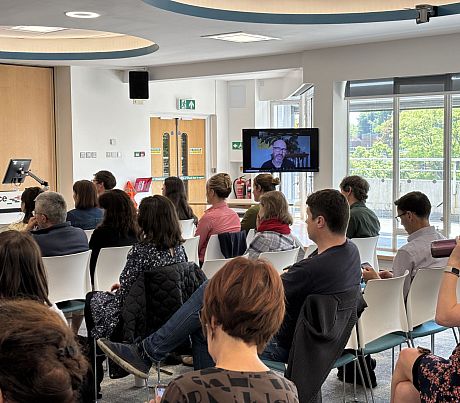Making impact: Business School researchers share insights and success stories
By: Cosmo Rana-Iozzi
Last updated: Wednesday, 18 June 2025

From left to right: Dr Elizabeth Rendon-Morales, Prof Matthew Agarwala, Prof Thomas Nowotny, Dr Emma Russell, Prof Martin Spinelli
The Business School’s Dr Emma Russell and Prof Matthew Agarwala joined a University-wide panel on 11 June 2025 to share their different but equally inspiring stories of success as researchers making a real positive difference in the world. The panel, organised as part of the University of Sussex Summer of Research gathering on ‘Deep Impact: maximising research culture, communications and connections’, showcased the School and wider University’s ongoing recognition by major movers and decision-makers in the UK and beyond for our world-class multidisciplinary expertise. The discussions also revealed a shared drive among our researchers to make the world a better place.
Russell, who co-developed the pioneering ‘agiLab’ with healthcare practitioners to deliver agile staff working at the NHS, emphasised the importance of collaboration: “What I’m learning from these NHS practitioners about what their real issues are or how I should be communicating with them or what they actually want to have investigated… really impacts me as a researcher”. Agarwala, who has brought together the insights of climate science and financial markets as well as advised governments, the United Nations and the World Bank on new statistical methods for measuring the economy, observed that in his case, impact is “fundamentally, at the start of what we do”. The panel host, Prof Martin Spinelli, meanwhile, discussed the evolving nature of research engagement and impact through his pioneering podcast series, one of which, Agricultural Voices Syria, he co-created with Business School researchers to bring real change on the ground for Syrian farmers.
 The keynote address was given by Scotland’s Rural College’s Prof Mark Reed, founder and CEO of Fast Track Impact, who invited the in-person and online audience of researchers to take part in a series of live interactive surveys. These helped to guide the ensuing discussion and Q&A with Prof Reed on different researchers’ personal experiences, whether successes or challenges, of achieving an impact beyond academia. Reed invited the room to reflect on themselves and their motivations, their professional identities and values. Among the motivations shared by the researchers in attendance were: “Engaging with communities,” “being part of an endeavour that seeks to make a real positive difference in the world,” and “helping people live more fulfilling lives”.
The keynote address was given by Scotland’s Rural College’s Prof Mark Reed, founder and CEO of Fast Track Impact, who invited the in-person and online audience of researchers to take part in a series of live interactive surveys. These helped to guide the ensuing discussion and Q&A with Prof Reed on different researchers’ personal experiences, whether successes or challenges, of achieving an impact beyond academia. Reed invited the room to reflect on themselves and their motivations, their professional identities and values. Among the motivations shared by the researchers in attendance were: “Engaging with communities,” “being part of an endeavour that seeks to make a real positive difference in the world,” and “helping people live more fulfilling lives”.
Reed challenged the idea, suggested by one audience member, that serendipity was a key to successful impact. He reminded the audience that, “the vast majority of supposedly serendipitous impacts have one thing in common: A person who was in the right place at the right time. And I’m going to suggest that we can all potentially be that person, regardless of career stage”.